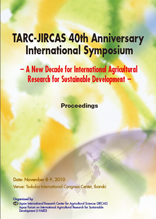International Agricultural Research Networking for Japanese Research Institutions

Japan International Research Center for Agricultural Research Center (JIRCAS) was founded as
Japanese sole “national center” for international agricultural research for developing regions and has
worked for various programs in collaboration with other national research institutions/universities and
related organizations like Japan International Cooperation Agency (JICA). JIRCAS has initiated many
international collaborative research projects for developing regions, and only a few other national
institutions have initiated such projects mainly with more developed regions. The first-stage Rice
Genome Research Program (2000-2004) led by National Institute of Agrobiological Sciences (NIAS)
was the very typical example of such initiatives.
However, recent regional and global challenges in agricultural sciences such as global warming,
food security/safety, biodiversity, etc. have pushed more institutions other than JIRCAS to involve in
and take initiatives for international activities. Such an example is the Monsoon Asia Agro-
Environmental Research Consortium (MARCO) initiated by National Institute of Agro-Environmental
Sciences (NIAES). Some other research institutions have also developed more international activities
and research.
Considering the above-mentioned changes, JIRCAS has made more efforts to contribute to
international research as follows:
???? Networking of Japanese research institutions, universities and other organizations through the
Japan Forum on International Agricultural Research for Sustainable Development (J-FARD) in
order to serve as a platform for cross-institutional coordination and cooperation across Japan.
???? Networking with some regional/international networks such as Asia-Pacific Association of
Agricultural Institutions (APAARI), Asia-Pacific Association of Forest Institutions (APAFRI) ,
Southeast Asia Fisheries Development Center (SEAFDEC), Coalition for African Rice
Development (CARD) and Global Forum on Agricultural Research (GFAR).
????Human resource development for international research by sending young scientists to research
institutions in developing regions and also inviting young scientists from such regions.
More challenges will be expected in relation to recent development of international research
issues such as Japanese government's new science and technology policy and CGIAR reforms
including mega-programs and other initiatives. Therefore, JIRCAS is discussing the following
approaches under the process of next mid-term (2011-2016) planning:???? Open JIRCAS’ resources (various know-how, network, etc.) more to other institutions
???? Develop more consortium-type international research projects by inviting other
organizations/universities
???? Invite more advanced developing/emerging regions as more equal partners in research projects
???? Use more regional and global fora or networks for research project development
???? Help human resource development for international research by inviting young researchers from
other Japanese organizations/universities.
And, JIRCAS itself will keep working for developing regions and function to bridge between various
stakeholders and partners from developing regions and Japanese research institutions/universities for
regional and global issues.
In conclusion, JIRCAS must always upgrade the functions of national center for international
research to adapt to regional and global changes and needs as well as national interests.
| Date of issued | |
|---|---|
| Creator | Satoru Miyata |
| Subject |
National center international research networking J-FARD human resource development |
| Publisher | Japan International Research Center for Agricultural Sciences |
| Available Online | |
| Issue | 2010 |
| spage | 97 |
| epage | 104 |
| Rights | Japan International Research Center for Agricultural Sciences |
| Language | eng |
